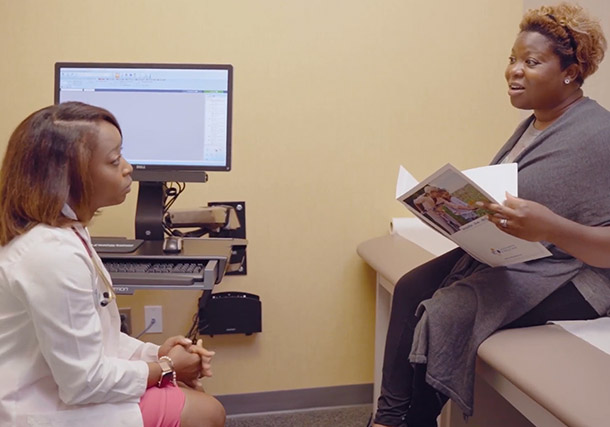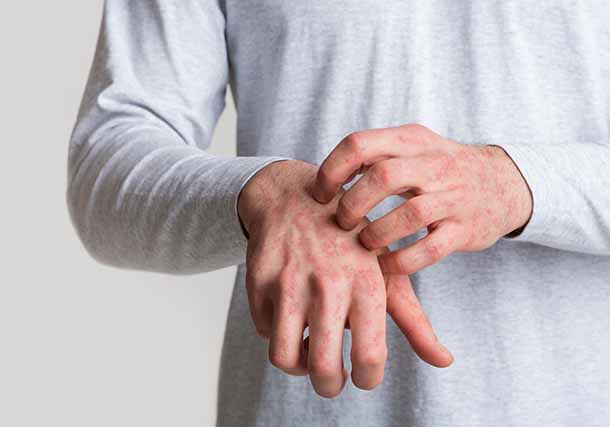
Patch Tests at Carolina Asthma & Allergy Center
While immediate allergic reactions are often easy to pinpoint, delayed hypersensitivity reactions can seem unpredictable and frustrating. These reactions can arise hours or even days after allergen exposure, making it difficult to trace dots between your symptoms and the offending allergen.
This is where patch testing shines. By applying tiny amounts of potential allergens to your skin and closely monitoring the reactions over time, we can identify the substances that may be causing skin irritation, eczema, contact dermatitis, or other reactions. This precise diagnostic method can help you make informed choices and more effectively manage your allergies.
Whether you are a seasoned allergy sufferer or have only recently started developing skin issues, our allergy patch testing services can be your roadmap to relief. Below, we explore the ins and outs of patch testing at Carolina Asthma & Allergy Center, including some of the benefits of patch testing, what to expect, and how to prepare for your test.
How to Request an Appointment for a Patch Test
If you suspect you have allergies or experience symptoms after encountering certain substances or foods, Carolina Asthma & Allergy Center offers thorough assessment and treatment. Our team of certified allergists and healthcare professionals is dedicated to helping you.
To schedule an appointment, contact our office by phone or use our website’s appointment request form. Our staff will assist in finding a convenient date and time for your visit. We have many convenient locations near you.
During your appointment, our allergists will consider what’s right for you by reviewing your medical history, performing a physical exam, and conducting customized allergy skin tests. If patch testing is advised, we will schedule a separate appointment for you.
Following the assessment and test results, our team will create a personalized treatment plan to manage your allergy symptoms and prevent future reactions. Reach out to us today to start scheduling your appointment and gain insights into your allergies while taking the first step toward managing them.
What Are Patch Tests?
Allergy patch testing is a specialized diagnostic tool that allergists use to identify delayed hypersensitivity reactions, contact allergies, and the substances responsible for skin-related allergic reactions. Unlike skin prick tests or blood tests, which are designed to detect immediate allergic reactions (like hay fever or food allergies), patch testing can uncover delayed allergic reactions that occur hours to days after exposure to allergens.

How Do Patch Tests Work?
Step 1: Applying Potential Allergens
A panel of potential allergens is selected based on your medical history, symptoms, and suspected triggers from your previous appointment.
Allergens can include substances like metals, fragrances, preservatives, chemicals, and even plant extracts. Small amounts of these allergens are placed onto specialized patches or discs, often made of hypoallergenic material, which are then applied to your skin (typically on the upper back). Markings are placed around the patches, the patches are reinforced with medical tape, and a map of the patch placement is made for the reading. Please allow up to an hour for the preparation and application of customized patches.
Step 2: Observation Period
After application, the patches are secured to the skin and left in place for a set period, usually 48 hours. During this time, it is important to avoid activities that might cause the patches to become wet or dislodged.
Step 3: Removing and Evaluating
We remove the patches, refresh the markings, allow the back to air out, and take a photo with the patient’s phone to reference if needed.
Step 4: Interpreting and Diagnosing
The allergist will carefully examine the skin beneath and note any reactions, such as redness, swelling, or blisters. The allergist will then interpret the skin reactions to determine which allergens have caused a positive response. The size and intensity of the skin reaction can provide insights into how severe your allergy is.
So what makes patch tests different from other allergy tests? A few things:
- Delayed Hypersensitivity: Patch testing focuses on delayed-type allergic reactions that take hours to days to develop, whereas other tests like skin prick tests or blood tests usually identify immediate allergic reactions that occur within minutes.
- Identifying Contact Allergens: Patch tests excel at identifying contact allergens—substances that come into direct contact with the skin and trigger localized reactions. This is crucial for anyone with eczema, contact dermatitis, or other skin-related allergies.
- Tailored Allergen Selection: Patch tests allow for customization of allergens based on your specific symptoms and suspected triggers, making them more personalized and targeted than other allergy tests.
- Comprehensive Allergy Assessment: While skin prick tests and blood tests are valuable when it comes to detecting common environmental and food allergies, patch testing addresses a different realm of allergies—contact allergies.
Allergy patch testing is a valuable tool that can help ensure you receive a comprehensive evaluation and personalized treatment plan tailored to your specific triggers.
Why Are Patch Tests Necessary?
There are a wide variety of allergens that can cause skin irritation. Exposure to these allergens may lead to hives, contact dermatitis, eczema, or other rashes that leave you itchy and uncomfortable.
Some of the most common types of skin allergens we see are:
- Drugs or medication allergies
- Dyes
- Metals, especially nickel
- Perfumes
- Chemicals found in household products
- Cosmetics
- Dental products
Some allergens may create irritation upon contact with the skin or make existing skin conditions (like contact dermatitis) worse. Others, like certain foods and medications, may create a histamine reaction that leads to hives. With so many potential allergens out there, patch testing helps narrow down the possibilities and ensure you have an appropriate treatment plan.
Preparing for Your Patch Test
What to Avoid Before the Test
It is important to prepare your skin for the patch test; this ensures the most accurate results.
- Try to avoid sun exposure for one to two weeks before your patch test. If you must be in the sun, use sunscreen on any areas where patches will not be placed.
- Avoid oral and injectable steroids for four weeks and topical steroids on the back for two weeks prior to patch placement.
- Do not use any topical medicines like creams, serums, or ointments anywhere that patches will be placed. Most patch testing is done on the back but ask your allergist for specific information on your upcoming patch test. If your patch is conducted on the back, please shave (not wax) your back if you have excessive back hair. Shaving will ensure appropriate adherence to the skin and help avoid discomfort during the removal process and should be done the day before your placement appointment.
What to Bring to the Test
Please bring a list of your current medications and any skincare products you regularly use. Wear comfortable, loose-fitting clothes to avoid any further irritation to your skin.
What to Expect After the Patch Test
You may experience mild discomfort or itching after patch removal, but it should not be too uncomfortable. We will provide you with guidance on managing these symptoms.
Understanding the Test Results
Our allergist will explain the test results to you during the post-test consultation, helping you understand which allergens may be causing your skin issues. Based on your patch test results, we will develop a personalized treatment plan. This may involve allergen avoidance strategies, skincare recommendations, or targeted therapies.
What Are the Benefits of Patch Testing?
There are two main benefits of patch testing: (1) clear diagnosis; and (2) targeted treatment.
Because hypersensitivity reactions often take hours or days to show up, narrowing down potential causes can be a complicated and frustrating process. Your skin may itch, burn, or feel irritated by something as seemingly innocuous as switching your brand of laundry detergent or taking a new medication, and unless you keep a journal of all your daily activities, the cause may be tough to pin down. Patch testing can give you quick, clear, and decisive answers as to what is causing your skin issues.
Patch testing can also help you narrow down potential treatment options. Many allergy treatments are one-size-fits-all; by knowing exactly what allergens (and what level of exposure) you’re most sensitive to, you can get a treatment plan that’s tailored to your needs.
Why Choose Carolina Asthma & Allergy Center for Patch Testing
In a world full of seemingly harmless substances that can trigger unwelcome skin reactions, understanding the root cause of allergic responses can be a game-changer.
Carolina Asthma & Allergy Center has served Charlotte and the surrounding areas since 1952, and we are the area’s largest allergy practice that is composed entirely of board-certified physicians. Our allergists and specialists are committed to improving your quality of life by helping you better understand and manage your allergies, and patch testing services are a crucial step toward achieving skin health and overall well-being.
Contact us today at (704) 372-7900 or fill out the brief contact form on our website to schedule your consultation and embark on your journey to allergy relief.
Patch Testing FAQs
Is the patch test painful?
At Carolina Asthma & Allergy Center, we prioritize your comfort and use gentle, non-invasive methods. While you may experience mild discomfort or itching during the test due to reactions to the allergens, it should not be too uncomfortable.
How long does the patch test take?
After the patches are applied, you will usually leave them on for about 48-72 hours. You will need to visit our clinic for patch application and removal, as well as a post-test consultation.
What should I do if I experience severe reactions during the test period?
Our staff will provide guidance on identifying and managing any adverse reactions. If you experience any symptoms or side effects beyond mild itching or burning, contact our clinic immediately.
Can children undergo patch testing?
Yes, patch testing is suitable for both adults and children. Our allergists will ensure the test is age-appropriate and safe for your child.
Will my insurance cover the patch test?
Insurance coverage varies, but since allergies can impact your daily life and overall health, patch testing is often a covered diagnostic procedure. Our team will work closely with you to navigate insurance matters and explore payment options.



